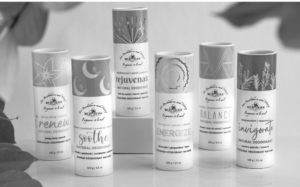Aluminum compounds, baking soda, essential oils and fragrance has the odour control industry in a state of information overload. Which one is right for you and what are the fundamental differences between the two products? Let’s start with the basics.

To sweat or not to sweat.
Deodorants and antiperspirants fundamentally serve different purposes by using distinct formulations. Deodorants primarily focus on neutralizing the body odour caused by bacteria, while antiperspirants focus on reducing sweat production. An antiperspirant typically utilizes aluminum compounds to temporarily block sweat glands which in turn reduces perspiration. On the other hand, natural deodorants use ingredients like baking soda, arrowroot powder, essential oils, and plant-based extracts to combat odour without interfering with the body’s natural sweating process. And let’s face it, sweating can be inconvenient, unsightly, and uncomfortable, but it is a natural bodily function that plays a huge role in regulating body temperature and eliminating toxins. Inhibiting sweat production can also interfere with our body’s efficient natural cooling system. Sweating helps us cool down.
So what’s the deal with aluminum?
Aluminum compounds are widely used for industrial and consumer products because of their beneficial properties, such as being lightweight, durable, and corrosion resistant. Aluminum is also a key antiperspirant ingredient for effective sweat prevention. But is it safe to use? The short answer for now is yes.
To start, it’s important to emphasize that we are exposed to aluminum on many levels through inhalation, ingestion, and dermal contact. Our bodies absorb small amounts through our food, water, and the environment and most tolerate these minimal levels of exposure without experiencing any adverse effects. More harmful health risks have been the subject of scientific research and debate with some studies suggesting possible links between aluminum exposure and health conditions like breast cancer, Alzheimer’s, and neurological disorders. The data and scientific evidence, however, is inconclusive and contradictory. A cohesive scientific consensus on this issue is still evolving, and further research is needed to establish a definitive link. Natural deodorants avoid this issue completely by not including this ingredient and offering an aluminum-free alternative.

How to balance sensitive skin.
Chances are if you have sensitive skin, you have dealt with an outbreak from a particular product or ingredient. So, is deodorant or antiperspirant better for sensitive skin? It really depends on the individual and what their sensitivities are. Aluminum compounds can cause skin irritation and allergic reactions, particularly in the underarm area, where the antiperspirant is applied. These reactions vary from person to person and can range from mild to severe. Natural deodorants often use gentle, plant-based ingredients, making them a suitable option for those with sensitive skin or allergies. If, however, there are severe skin sensitivities, natural ingredients like baking soda or essential oils can also cause an allergic reaction. Like with everything, individual experiences will vary and conducting a patch test is the most effective way to identify a sensitivity.
What is better for the planet? Natural deodorants often prioritize eco-friendly formulations and sustainable packaging. They tend to use natural and biodegradable ingredients and avoid synthetic chemicals and additives that can contribute to environmental pollution. Additionally, many natural deodorants are packaged in recyclable or compostable materials, reducing waste and the environmental impact.
 Which one works better?
Which one works better?
Antiperspirants utilize the aluminum to actively prevent sweating, so there is reason to believe it will be effective. The efficacy and performance of natural deodorants depend on factors such as formulation, personal body chemistry, and lifestyle factors like physical activity or stress levels. Experimenting with different brands and finding the one that works best for you is often the key to choosing the right deodorant.
The choice is yours.
Some people simply prefer using natural products on their bodies, avoid synthetics and potentially harmful chemicals whenever possible. Natural deodorants cater to this preference by offering alternative options that align with an individual’s values and lifestyle choices. Some perceive antiperspirants as unhealthy due to the sheer nature of how it works. Finding what is right for you is a personal decision that can take lots of trial and error to find what works for you.
